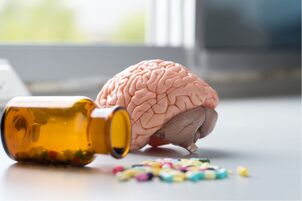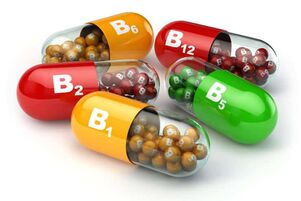Hello dear readers! Have you ever felt that your brain is tired from working and your memory is starting to fail? I assure you: most people on the planet experience such sensations. Of course, overwork, the effects of megacities, chronic diseases, stress, just aging, are to blame for everything the body struggles with nutrients. As a result, our brains do not always have enough vitamins and minerals, because, as you know, the saturation of foods with vitamins and minerals leaves much to be desired. It takes a few weeks to drink a vitamin and mineral complex and everything is fixed. Let's take a look at which vitamins are best for improving brain function and memory.
What vitamins does the brain need?
The brain is the main organ that regulates the functioning of all organs and systems in our body. Decreased activity due to stress, nutrition, disease, hormonal imbalance.

Vitamins play an important role in the central nervous system. They are called organic compounds of various chemical nature. They are found in food and enter the body with them. Our body produces some of them on its own. However, due to reduced immunity and poor quality products, these compounds are often lacking in our body. And it is the brain that reacts first to deficiency. Memory is impaired, concentration decreases. Every system or organ in the body needs certain biological substances, vitamins and minerals more than others. For example, hair needs biotin, zinc, selenium (I wrote about vitamins for hair), the immune system needs B, C, vit group vitamins. D3, the female body needs vita. Groups A, E, B, a woman needs vitamins after childbirth.
Personally, I am in favor of natural vitamins, foods, herbs, extracts, and I have written a lot about it, but sometimes the body needs to be supported by pharmaceuticals, and at certain moments in life they are simply necessary.
To avoid confusion about which vitamins are in which products, read the article "We choose vitamins by color in products".
Children in particular need regular vitamin intake. Their bodies grow rapidly and require nutrients to build new cells. To overcome the deficiency of vitamin compounds, doctors recommend taking pharmaceuticals with synthetic analogues.
Without a lot of compounds that are good for the body, pay attention to the following substances that are important for the normal functioning of the brain.
Beta Carotene and Vitamin A
Beta-carotene is a mixture that is converted into vitamin A under the influence of coloring pigment. The substance improves memory, vision, protects the brain from adverse effects. The connection prevents the degeneration of thought.
B vitamins
The group includes a number of vitamin compounds that are beneficial for both adults and children. They are powerful antioxidants. When not enough in the body, neurotransmitters are destroyed. Each type of vitamin has an effect on the brain:
- B1 (thiamine).Most of the substance is in the brain and central nervous system. It affects the memory the most. Ingredients prevent brain aging by providing oxygen to tissues. Vitamin B1 deficiency leads to depression, weakness and fatigue.
- B2 (riboflavin).Connection provides energy to the body, stimulates active brain activity. If the vitamin is not enough, fatigue is felt.
- B3 (nicotinic acid).The substance is required for the synthesis of enzymes. The complex helps the body produce energy, gives it to the brain.
- B5 (pantothenic acid).Vitamin is very unstable, it is quickly destroyed during meals. Communication is responsible for long-term memory and the transmission of information between brain cells. The compound protects the brain from the effects of nicotine and alcohol.
- B6 (pyridoxine).Connection improves thinking ability, prevents depression. It is better to take vitamin supplements to provide the body with this substance.
- B9 (folic acid).Vitamin is responsible for memory, normal functioning of the nervous system, gives strength. The complex helps pregnant women give birth to a healthy baby because it is required for the formation of the fetus's central nervous system.
- B12 (cyanocobalamin).Substance allows the body to move from sleep to wakefulness and vice versa. Closure is also closely related to short-term memory. With B12 deficiency, difficult adaptation occurs when changing the time zone.

Vitamin C
We know ascorbic acid as a substance that activates the immune system. However, the substance relieves mental stress and is recommended for fatigue. In addition, ascorbic acid is an antioxidant that protects the brain from aging.
Vitamin D
In addition to improving the condition of the skeletal system, you also need vitamin D or calciferol to improve mood and memory. Protects the nervous system from diseases, including oncology, and stimulates the cardiovascular system. Cognitive disorders occur with calciferol deficiency. Learn more about vitamin D and the foods it contains.
Vitamin K
Vikasol or vitamin K is used to speed up the brain, slow down the aging of brain cells and prevent Alzheimer's disease. Improves complex cognitive functionLesitin
This is the name of a phospholipid that stimulates the nervous system. In the presence of vitamin B5, it is converted to acetylcholine, a neurotransmitter responsible for the transmission of nerve impulses.
In the first years of life, the baby's body receives lecithin from breast milk. Speech development, social adaptation, and the baby's progress depend on the amount of phospholipids received. Lecithin helps an adult maintain effectiveness and feel less tired. Learn more about lecithin and what foods it contains.
Omega-3 fatty acids
These compounds in fish oils, nuts and seeds are literally brain food. Accelerates reactions, improves memory and helps maintain mental clarity.
creatine
Nitrogen-containing amino acids accelerate cell renewal. Plays an energy-saving role, provides good memory and analytical thinking. 5 g of substance is enough to maintain brain activity.
L-tyrosine
An amino acid found in muscle tissue. Provides the synthesis of norepinephrine, the adrenaline and neurotransmitter dopamine. Indicated for people with additional mental work with this substance. Improves concentration, increases fatigue
L-carnitine
Another amino acid that improves memory and brain function. If you take the supplement regularly, you can activate the brain and increase efficiency by eliminating chronic fatigue.
Symptoms of vitamin deficiency
Several factors can damage brain cells. They improve gradually, but with age, the process slows down with poor nutrition, illness and stress. Vitamin deficiency affects the brain's ability to build cells and maintain the basic functions of the central nervous system:
- depression develops, anxiety, aggression, mood swings occur;
- memory decreases;
- coordination is broken;
- sleep is disturbed;
- apathy, fatigue appears;
- has a headache;
- appears unconscious, difficulty concentrating;
- the thought process slows down;
- weight loss, appetite;
- Children have problems with research, fatigue increases.
Vitamin deficiency can hide more serious diseases. Before taking it, it is better to consult a doctor, because an allergic reaction or other reactions are possible against the background of existing pathologies.







































































